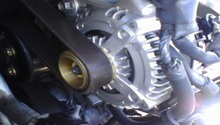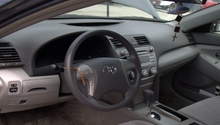Toyota Camry: Why is My Car Squeaking?
Nothing is more annoying or embarrassing than driving around in a squeaking Toyota Camry. Here's how to diagnose the issue.
This article applies to the Toyota Camry (1997-2011).
There aren't many things more annoying than a relentless squeaking noise in your Toyota Camry. Usually we just crank up the radio so we can't hear it, but this isn't always a cure. The truth is that squeak could be coming from a variety of different places, so silencing it could be a very simple or a very complicated task depending on the actual culprit. Now that you're ready to rid your car of that squeak for good, we're going to help you track down its source.

Materials Needed
- Jack
- Jack stands
- Litihium grease or WD-40 spray
- Engine belts
Step 1 – Check suspension
It could be worn or broken.
Some of the most common sources of a squeak, other than an interior panel, are worn suspension parts. Your shocks, various suspension bushings, and sway bar links all tend to squeak when they are wearing/worn out.
To check your shocks, push down firmly on each corner of the car above each wheel. If you hear excessive squeaking, or the car bounces up and down rather than simply coming back up, it's time for some new shocks.
Bushings should be inspected for damage, cracks, wear, and/or a flattened appearance. Check the bushings on each strut tower mount, the sway bar links, and inside the suspension arm.

If the suspension parts are all in proper shape, continue to Step 2.
Step 2 – Check steering wheel
It could be in need of lubrication.
If you have a squeaking noise coming from the steering wheel/column, it's possible that the boot or shaft needs to be lubed. Look under the dash, on the driver's side near the pedals, and you can see where the rubber boot section goes into the fire wall. You can use either lithium grease, spray some WD-40, or other lubricant into this section to solve the problem.

If there isn't any sound coming from the steering column, then go to Step 3.
Step 3 – Check belts
Your belts could be tight, worn, or cracked.
If the squeaky noise is coming from the engine, either at startup, low/high RPM, or when your turn the air conditioner on, it is possible that you have one or more worn belts. Sometimes belts squeak only for a minute or two when you start the car as well. To diagnose a squeaky belt problem, first look for belt tension and look for any cracks or wear on all the belts. If the belt is in good shape but is just loose, tighten it up. If the belt is visibly worn or cracked, now is a good time to replace it before it completely breaks and fails, leaving you stranded on the side of the road.

Why is My Car Squeaking?
Related Discussions
- Rear Suspension Squeaking - CamryForums.com
- Squeaking Steering Column - CamryForums.com
- Squeaky Belts - CamryForums.com






